Lona Manning's Blog, page 23
April 1, 2021
"A Very Curious Specimen of Heath"
"A Very Curious Specimen of Heath:" the Anglo-Irish subtext of Mansfield Park
A special guest editorial by Lila Proof, PhD Mansfield Park, a novel set amongst the landed gentry of Britain, has been held to imply an endorsement of a empiricist and patriarchal status quo. On the contrary, a careful interrogation of the text, informed by an anti-colonialist lens, establishes that Mansfield Park contains a cloaked yet pointed condemnation of imperialism. The current critical conversation, however, does not adequately address Austen's allusions to Ireland.
Mansfield Park, a novel set amongst the landed gentry of Britain, has been held to imply an endorsement of a empiricist and patriarchal status quo. On the contrary, a careful interrogation of the text, informed by an anti-colonialist lens, establishes that Mansfield Park contains a cloaked yet pointed condemnation of imperialism. The current critical conversation, however, does not adequately address Austen's allusions to Ireland.
Early in the novel, the Bertram girls ask Fanny Price "which way she would go to get to Ireland." Fanny's response that she would "cross to the Isle of Wight," contextualizes the struggle against empire. She is saying that the Bertrams shouldn't go to Ireland at all--but tellingly, she is then derided as "ignorant."
But this is merely prelude to the Sotherton episode in the novel. On the journey out -- we might almost say "on the expedition" -- Julia Bertram sits beside Henry Crawford on the barouche-box. He "entertains" her with some anecdotes about an "old Irish groom" of his uncle's. Henry's bigoted remarks are not necessary to move the plot along. Austen could easily have come up with an alternative topic for Henry. Julia joins in the laughter at the expense of a man who is both an immigrant and a subordinate.
Having unmistakably established her theme, Austen includes a pointed (but hitherto overlooked) reference to the sufferings of the Irish peasantry when Maria Bertram comments on the miserable dwellings around Sotherton: "Here begins the village. Those cottages are really a disgrace." Her callous remark is followed by an impossible-to-miss (although everyone has missed it) reference to the Catholic Question: "the church spire is reckoned remarkably handsome." Maria's triumphal remark underscores the discourses of power around the Anglican Church and the subsumption of Irish identity.
Thus the journey from Mansfield Park to Sotherton is established as a symbolic re-enactment of the conquest of Ireland, with Henry Crawford laughing as he revels in English hegemony.
Austen pointedly tells us that the manor house at Sotherton was built in the time of Queen Elizabeth the First. Readers are directed to cast their minds back to the age of Good Queen Bess, when the English were aggressively extending their control over Ulster and other Irish territories. Austen brings up the subject of Ireland again in the manor chapel. We see the colonial landscape paralleled and echoed with the interiority of domestic space when Mary Crawford speaks patronizingly of the former "Mrs. Bridgets" who used to pray there. Bridget is unmistakably an Irish/Gaelic name. The name "Bridget" does not appear anywhere else in Austen.
The manor-house at Sotherton is so large, Austen pointedly tells us, that most of the rooms are good only for government revenue in the form of the window tax. Why mention the government while touring a stately English home, unless to reference the depredations of empire? While Mrs. Rushworth complacently boasts of the "loyal efforts" of her ancestors in serving English kings and queens, we are told that "Henry Crawford was looking grave and shaking his head at the windows." Henry's imperializing gaze looks "across a lawn," and beyond that, to "tall iron palisades and gates." The introduction of the idea of palisades and gates in what is supposedly a serene and peaceful English landscape should give us a faint sense of unease. Why does Austen use the term "palisade," connoting as it does the idea of defense, of being besieged, under attack? Why not "wall" or "enclosure"?
Nothing is an accident in Austen. What do palisades have to do with Ireland? Rather a lot, actually. Palisades derives from the Latin "pale," as in "beyond the pale," an expression which has lingered in our language to the present day. It refers to the territory held by the earliest Norman invaders in Ireland. Going "beyond the pale" meant venturing beyond the safety of the palisade to the Irish wilderness beyond.
Once the young people venture beyond the safe enclosure around the house, they find themselves in the "Wilderness." The wilderness inevitably recalls characteristic portrays of the Irish people as wild, uncouth, lawless savages. The wilderness has potency as both substance and symbol.
While walking in the Wilderness, Mary Crawford urges Edmund to join the army -- the same army which brutally crushed an Irish uprising in 1798. By never mentioning the Irish conquest directly, Austen places it everywhere in the narrative.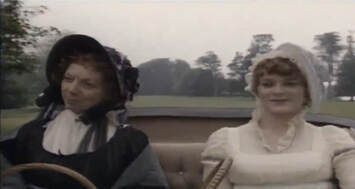 Mrs. Norris departs with the spoils of empire -- cream cheese, pheasant eggs and heath Austen emphasizes the geographical as well as the psychological distance between Mansfield and Sotherton by telling us that the journey to Sotherton takes Fanny farther outside of Mansfield than she has ever been before and she "was soon beyond her knowledge." The landscape of Sotherton metaphorically represents a terra incognita, in which the young people chase around after each other, unable to obtain what they truly want.
Mrs. Norris departs with the spoils of empire -- cream cheese, pheasant eggs and heath Austen emphasizes the geographical as well as the psychological distance between Mansfield and Sotherton by telling us that the journey to Sotherton takes Fanny farther outside of Mansfield than she has ever been before and she "was soon beyond her knowledge." The landscape of Sotherton metaphorically represents a terra incognita, in which the young people chase around after each other, unable to obtain what they truly want.
To the British, Ireland was seen as a strange, wild, foreign place. As well, Ireland was a place in need of "improvement." Charles Dickens, for example, approved of the Act of Union between England and Ireland on the grounds that Ireland "had been getting on very ill by itself." As Rushworth says, “It wants improvement, ma’am, beyond anything. I never saw a place that wanted so much improvement in my life."
Just as previous scholarship has established that Austen was greatly influenced by Mary Wollstonecraft, her repeated and ironic use of "improvement" suggests she is referencing Percy Bysshe Shelley's 1812 Address to the Irish People: "There is no doubt but the world is going wrong, or rather that it is very capable of being much improved... Society is produced by the wants, Government by the wickedness, and a state of just and happy equality, by the improvement and reason of man... What I mean by this improvement is, the inducement of a more equal and general diffusion of happiness and liberty." Thus Austen, with double-edged meaning, condemns the "improvement" of English rapacity while pointing to Godwinian anarchism as the antidote to colonialism.
After their walk in the wilderness, Mary, Edmund and Fanny return to the house to "lounge away" the time until dinner "with chit-chat, and Quarterly Reviews." The Quarterly Review was a conservative periodical, favored by politicians who were opposed to Catholic Emancipation. By characterizing the Review as something only fit to lounge away the time with, intellectually on a par with "chit chat," we can practically see Austen's lip curling in a sneer. This was a particularly daring thrust, as the Quarterly Review was the flagship publication of John Murray, her own publisher. Was Murray so incensed by Austen's speaking truth to power, that he declined to send Mansfield Park out to literary magazines? Can this be the reason why the novel received no reviews? We can only speculate. But really, no other interpretation seems possible.
Austen tells us that Mrs. Norris "obtained" some cream cheese and pheasants' eggs. Mrs. Norris falsely represents her ill-gotten gains as being pressed upon her by the housekeeper: ("I stood out as long as I could.") But the cream cheese is a form of forced tribute. It is not insignificant that cheese is created by pressing curds into a mold; the associations with force, conformity, and violence, are unsettling.
The Bertrams, Crawfords, and Mrs. Norris hastily decamp from Sotherton as soon as is decently possible after eating a hearty dinner. They figuratively represent the absentee landlords of Ireland who use the rents from their Irish holdings to maintain their lifestyles back in England. 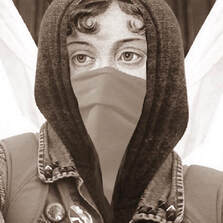 Speaking truth to power! On the way back to Mansfield, the talk in the barouche is all about the spoils of empire -- Mrs. Norris has so much stolen bounty that Maria complains that one of the baskets "has been knocking my elbow unmercifully," although of course this is a metaphorical reference to the fact that her guilty complicity is knocking at her conscience. Even Fanny is made an accessory to the crime when Mrs. Norris asks her to hold the cream cheese. We are invited to perceive Fanny-as-victim while also seeing her, in more formalist terms, as a beneficiary of colonialism. Austen invokes a deliberate and knowing irony as well in the pointed reference to pheasants. Pheasants are also colonizers, interlopers in the bird world, introduced to the British Isles by the Romans. Austen forces the reader to confront the the reality that no-one can escape complicity, not even exotic fowl.
Speaking truth to power! On the way back to Mansfield, the talk in the barouche is all about the spoils of empire -- Mrs. Norris has so much stolen bounty that Maria complains that one of the baskets "has been knocking my elbow unmercifully," although of course this is a metaphorical reference to the fact that her guilty complicity is knocking at her conscience. Even Fanny is made an accessory to the crime when Mrs. Norris asks her to hold the cream cheese. We are invited to perceive Fanny-as-victim while also seeing her, in more formalist terms, as a beneficiary of colonialism. Austen invokes a deliberate and knowing irony as well in the pointed reference to pheasants. Pheasants are also colonizers, interlopers in the bird world, introduced to the British Isles by the Romans. Austen forces the reader to confront the the reality that no-one can escape complicity, not even exotic fowl.
And of all the plants which Mrs. Norris could have borne away from Sotherton, she has taken a "very curious specimen" of heath! Not merely a heath; Austen emphasizes the "other-ness" of the heath. While heath grows abundantly in Ireland, heaths and heathers are more commonly associated with Scotland. Does Austen intend for the heath to allude to the Scots diaspora? Is the transplanted heath a reference to the notorious Highland Clearances? The question is one that merits additional study.
What is beyond dispute, however, is that a novel that has been naively interpreted as focusing on self-knowledge and personal morality is in fact nothing of the kind. Austen stands revealed not as a chronicler of individual virtues, faults, and foibles, but as a radical activist who condemned her country and her countrymen in the starkest (but artfully understated) terms.
The Sotherton episode closes with a telling remark about the uneasy feelings of the invaders -- outwardly triumphing, perhaps, but inwardly guilty: "[W]hen Mrs. Norris ceased speaking, it was altogether a silent drive to those within."
The silence is deafening. Author's note: I am indebted to the pioneering scholarship of Dr. Aprille Stulti in her seminal work, Conquest and Cream Cheese: Toward an Anglo-Irish Understanding of Mansfield Park, although academic honesty compels me to note that Professor Stulti did not find half of the obvious allusions which I have found. My colleague Aprille might say, with Fanny, “It was foolish of me not to think of all that."
A special guest editorial by Lila Proof, PhD
 Mansfield Park, a novel set amongst the landed gentry of Britain, has been held to imply an endorsement of a empiricist and patriarchal status quo. On the contrary, a careful interrogation of the text, informed by an anti-colonialist lens, establishes that Mansfield Park contains a cloaked yet pointed condemnation of imperialism. The current critical conversation, however, does not adequately address Austen's allusions to Ireland.
Mansfield Park, a novel set amongst the landed gentry of Britain, has been held to imply an endorsement of a empiricist and patriarchal status quo. On the contrary, a careful interrogation of the text, informed by an anti-colonialist lens, establishes that Mansfield Park contains a cloaked yet pointed condemnation of imperialism. The current critical conversation, however, does not adequately address Austen's allusions to Ireland.Early in the novel, the Bertram girls ask Fanny Price "which way she would go to get to Ireland." Fanny's response that she would "cross to the Isle of Wight," contextualizes the struggle against empire. She is saying that the Bertrams shouldn't go to Ireland at all--but tellingly, she is then derided as "ignorant."
But this is merely prelude to the Sotherton episode in the novel. On the journey out -- we might almost say "on the expedition" -- Julia Bertram sits beside Henry Crawford on the barouche-box. He "entertains" her with some anecdotes about an "old Irish groom" of his uncle's. Henry's bigoted remarks are not necessary to move the plot along. Austen could easily have come up with an alternative topic for Henry. Julia joins in the laughter at the expense of a man who is both an immigrant and a subordinate.
Having unmistakably established her theme, Austen includes a pointed (but hitherto overlooked) reference to the sufferings of the Irish peasantry when Maria Bertram comments on the miserable dwellings around Sotherton: "Here begins the village. Those cottages are really a disgrace." Her callous remark is followed by an impossible-to-miss (although everyone has missed it) reference to the Catholic Question: "the church spire is reckoned remarkably handsome." Maria's triumphal remark underscores the discourses of power around the Anglican Church and the subsumption of Irish identity.
Thus the journey from Mansfield Park to Sotherton is established as a symbolic re-enactment of the conquest of Ireland, with Henry Crawford laughing as he revels in English hegemony.
Austen pointedly tells us that the manor house at Sotherton was built in the time of Queen Elizabeth the First. Readers are directed to cast their minds back to the age of Good Queen Bess, when the English were aggressively extending their control over Ulster and other Irish territories. Austen brings up the subject of Ireland again in the manor chapel. We see the colonial landscape paralleled and echoed with the interiority of domestic space when Mary Crawford speaks patronizingly of the former "Mrs. Bridgets" who used to pray there. Bridget is unmistakably an Irish/Gaelic name. The name "Bridget" does not appear anywhere else in Austen.
The manor-house at Sotherton is so large, Austen pointedly tells us, that most of the rooms are good only for government revenue in the form of the window tax. Why mention the government while touring a stately English home, unless to reference the depredations of empire? While Mrs. Rushworth complacently boasts of the "loyal efforts" of her ancestors in serving English kings and queens, we are told that "Henry Crawford was looking grave and shaking his head at the windows." Henry's imperializing gaze looks "across a lawn," and beyond that, to "tall iron palisades and gates." The introduction of the idea of palisades and gates in what is supposedly a serene and peaceful English landscape should give us a faint sense of unease. Why does Austen use the term "palisade," connoting as it does the idea of defense, of being besieged, under attack? Why not "wall" or "enclosure"?
Nothing is an accident in Austen. What do palisades have to do with Ireland? Rather a lot, actually. Palisades derives from the Latin "pale," as in "beyond the pale," an expression which has lingered in our language to the present day. It refers to the territory held by the earliest Norman invaders in Ireland. Going "beyond the pale" meant venturing beyond the safety of the palisade to the Irish wilderness beyond.
Once the young people venture beyond the safe enclosure around the house, they find themselves in the "Wilderness." The wilderness inevitably recalls characteristic portrays of the Irish people as wild, uncouth, lawless savages. The wilderness has potency as both substance and symbol.
While walking in the Wilderness, Mary Crawford urges Edmund to join the army -- the same army which brutally crushed an Irish uprising in 1798. By never mentioning the Irish conquest directly, Austen places it everywhere in the narrative.
 Mrs. Norris departs with the spoils of empire -- cream cheese, pheasant eggs and heath Austen emphasizes the geographical as well as the psychological distance between Mansfield and Sotherton by telling us that the journey to Sotherton takes Fanny farther outside of Mansfield than she has ever been before and she "was soon beyond her knowledge." The landscape of Sotherton metaphorically represents a terra incognita, in which the young people chase around after each other, unable to obtain what they truly want.
Mrs. Norris departs with the spoils of empire -- cream cheese, pheasant eggs and heath Austen emphasizes the geographical as well as the psychological distance between Mansfield and Sotherton by telling us that the journey to Sotherton takes Fanny farther outside of Mansfield than she has ever been before and she "was soon beyond her knowledge." The landscape of Sotherton metaphorically represents a terra incognita, in which the young people chase around after each other, unable to obtain what they truly want.To the British, Ireland was seen as a strange, wild, foreign place. As well, Ireland was a place in need of "improvement." Charles Dickens, for example, approved of the Act of Union between England and Ireland on the grounds that Ireland "had been getting on very ill by itself." As Rushworth says, “It wants improvement, ma’am, beyond anything. I never saw a place that wanted so much improvement in my life."
Just as previous scholarship has established that Austen was greatly influenced by Mary Wollstonecraft, her repeated and ironic use of "improvement" suggests she is referencing Percy Bysshe Shelley's 1812 Address to the Irish People: "There is no doubt but the world is going wrong, or rather that it is very capable of being much improved... Society is produced by the wants, Government by the wickedness, and a state of just and happy equality, by the improvement and reason of man... What I mean by this improvement is, the inducement of a more equal and general diffusion of happiness and liberty." Thus Austen, with double-edged meaning, condemns the "improvement" of English rapacity while pointing to Godwinian anarchism as the antidote to colonialism.
After their walk in the wilderness, Mary, Edmund and Fanny return to the house to "lounge away" the time until dinner "with chit-chat, and Quarterly Reviews." The Quarterly Review was a conservative periodical, favored by politicians who were opposed to Catholic Emancipation. By characterizing the Review as something only fit to lounge away the time with, intellectually on a par with "chit chat," we can practically see Austen's lip curling in a sneer. This was a particularly daring thrust, as the Quarterly Review was the flagship publication of John Murray, her own publisher. Was Murray so incensed by Austen's speaking truth to power, that he declined to send Mansfield Park out to literary magazines? Can this be the reason why the novel received no reviews? We can only speculate. But really, no other interpretation seems possible.
Austen tells us that Mrs. Norris "obtained" some cream cheese and pheasants' eggs. Mrs. Norris falsely represents her ill-gotten gains as being pressed upon her by the housekeeper: ("I stood out as long as I could.") But the cream cheese is a form of forced tribute. It is not insignificant that cheese is created by pressing curds into a mold; the associations with force, conformity, and violence, are unsettling.
The Bertrams, Crawfords, and Mrs. Norris hastily decamp from Sotherton as soon as is decently possible after eating a hearty dinner. They figuratively represent the absentee landlords of Ireland who use the rents from their Irish holdings to maintain their lifestyles back in England.
 Speaking truth to power! On the way back to Mansfield, the talk in the barouche is all about the spoils of empire -- Mrs. Norris has so much stolen bounty that Maria complains that one of the baskets "has been knocking my elbow unmercifully," although of course this is a metaphorical reference to the fact that her guilty complicity is knocking at her conscience. Even Fanny is made an accessory to the crime when Mrs. Norris asks her to hold the cream cheese. We are invited to perceive Fanny-as-victim while also seeing her, in more formalist terms, as a beneficiary of colonialism. Austen invokes a deliberate and knowing irony as well in the pointed reference to pheasants. Pheasants are also colonizers, interlopers in the bird world, introduced to the British Isles by the Romans. Austen forces the reader to confront the the reality that no-one can escape complicity, not even exotic fowl.
Speaking truth to power! On the way back to Mansfield, the talk in the barouche is all about the spoils of empire -- Mrs. Norris has so much stolen bounty that Maria complains that one of the baskets "has been knocking my elbow unmercifully," although of course this is a metaphorical reference to the fact that her guilty complicity is knocking at her conscience. Even Fanny is made an accessory to the crime when Mrs. Norris asks her to hold the cream cheese. We are invited to perceive Fanny-as-victim while also seeing her, in more formalist terms, as a beneficiary of colonialism. Austen invokes a deliberate and knowing irony as well in the pointed reference to pheasants. Pheasants are also colonizers, interlopers in the bird world, introduced to the British Isles by the Romans. Austen forces the reader to confront the the reality that no-one can escape complicity, not even exotic fowl. And of all the plants which Mrs. Norris could have borne away from Sotherton, she has taken a "very curious specimen" of heath! Not merely a heath; Austen emphasizes the "other-ness" of the heath. While heath grows abundantly in Ireland, heaths and heathers are more commonly associated with Scotland. Does Austen intend for the heath to allude to the Scots diaspora? Is the transplanted heath a reference to the notorious Highland Clearances? The question is one that merits additional study.
What is beyond dispute, however, is that a novel that has been naively interpreted as focusing on self-knowledge and personal morality is in fact nothing of the kind. Austen stands revealed not as a chronicler of individual virtues, faults, and foibles, but as a radical activist who condemned her country and her countrymen in the starkest (but artfully understated) terms.
The Sotherton episode closes with a telling remark about the uneasy feelings of the invaders -- outwardly triumphing, perhaps, but inwardly guilty: "[W]hen Mrs. Norris ceased speaking, it was altogether a silent drive to those within."
The silence is deafening. Author's note: I am indebted to the pioneering scholarship of Dr. Aprille Stulti in her seminal work, Conquest and Cream Cheese: Toward an Anglo-Irish Understanding of Mansfield Park, although academic honesty compels me to note that Professor Stulti did not find half of the obvious allusions which I have found. My colleague Aprille might say, with Fanny, “It was foolish of me not to think of all that."
Published on April 01, 2021 00:00
March 23, 2021
CMP#34 Two Pictures of Perfection
 Clutching My Pearls is about Jane Austen and the times she lived in. Click here for the first in the series. "Pictures of perfection, as you know, make me sick and wicked." -- Jane Austen
Clutching My Pearls is about Jane Austen and the times she lived in. Click here for the first in the series. "Pictures of perfection, as you know, make me sick and wicked." -- Jane Austen
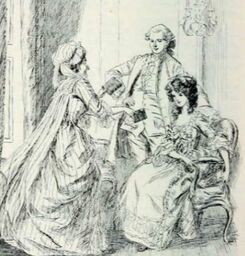 Fanny Burney's Evelina -- practically perfect in every way In previous posts, we looked at the utterly virtuous heroines of 18th century literature, the prescribed role models for impressionable young novel readers. We also asked whether Fanny Price is too perfect, or intended to be perfect, and whether she has any faults.
Fanny Burney's Evelina -- practically perfect in every way In previous posts, we looked at the utterly virtuous heroines of 18th century literature, the prescribed role models for impressionable young novel readers. We also asked whether Fanny Price is too perfect, or intended to be perfect, and whether she has any faults. Creating a perfect heroine is an artistic challenge. First, without faults to overcome, it’s hard for a character to have a character arc. The perfect heroine has to struggle against circumstances that are none of her own making – she is an orphan, or an outcast, she is treated unjustly, she is misunderstood, she is the victim of jealousy or selfishness. And if she is a perfect 18th century female, it’s hard to give her any agency. She can’t travel on her own or earn her own money or give anybody a dressing-down. More typically, the 18th-century heroine weeps her way through her travails until she gets to her happy ending. However, I’ve recently encountered two heroines who are not entirely ridiculous: one is Adela Cleveland in Sarah Burney’s Traits of Nature (1812) and the other is the mother in Jane West’s The Advantages of Education (1793). Sarah Burney is the half-sister of the more famous Fanny Burney. “Yet her [own] literary achievement is not inconsiderable,” as scholar Lorna J. Clark points out. Burney published “five works between 1796 and 1839 which sold well, [including Clarentine], one of which was a bestseller, several of which ran to second editions, were translated into French and German, and pirated abroad.” In other words, she outsold Jane Austen in her time.
Adela in Traits of Nature is the daughter of a broken marriage. Her vengeful father banishes little Adela to the distant home of a kindly clergyman. Her mother’s disgrace, and the hint of illegitimacy, hang over Adela’s head. She grows up to be beautiful, principled, intelligent, kind, and accomplished. Through no fault of her own, she is mistreated wherever she goes. Her reunion with her mother goes badly because a free-loading female friend insists on reading naughty poetry in the evening. The mother becomes cold and resentful when she senses Adela's disapproval. “Adela grieved at these symptoms of diminished affection [from her mother]; but she could not, even in her humblest moments, condemn herself... and was persuaded, that whatever might be the rights and privileges of a parent, it was impossible they should be so unlimited as to authorize the contamination of that mental purity which it was every woman’s duty to preserve unblemished…."
Adela remains as dutiful as she possibly can toward such an unworthy parent: "She considered it as an indispensable duty to silence every murmur, and submit to every discomfort… Wearily and heavily, therefore, now dragged on her hours, each of which, except those devoted to exercise and charitable visits. acquired augmented bitterness…”
Adela goes to visit her London cousins; the mother and oldest daughter also turn on her. Our heroine's behavior is irreproachable, but cousin Jemima is jealous because Lord Ennerdale, (Adela's childhood sweetheart) prefers Adela to her. Adela stands up for herself, firmly and with dignity. "But [Adela's] unshaken self-command, which could neither be incited to tears by their injustice, nor provoked to passion by their acrimony, exasperated their pride beyond all bounds."
In the third volume, Adela’s sister presses her into service to help nurse Lord Ennerdale's ailing son. (Lord Ennerdale is a widower.) Adela temporarily moves into the London home of Lord Ennerdale’s sister-in-law to lend a hand. This brings more jealousy, snobbery, and venom down on her head:
“'And you, Miss Cleveland. What motive instigated you to so much solicitude?'
"Adela fancied that this question was asked with a lurking sneer… Adela again raised her eyes from her work, and with the most petrifying coldness, answered: 'I shall be in this house but a very short time longer; my motives for remaining in it, I have frankly acknowledged, yet, even if your Ladyship discredits them, I am entitled, as the guest of your daughter, to hope that you will spare me any insinuations... '“
The horrid people she has to deal with can only push Adela so far before she pushes back.
Unable to marry Lord Ennerdale because her brother hates him, Adela is pressured by her father to marry a man she doesn't love. Dad's a horrible person, but she keeps trying to win his love and respect. By modern standards Adela would be a masochist to put up with the treatment she receives from her father and brother. By 18th-century heroine standards, she is a tower of strength.
After five volumes, Adela finally gets her happy ending.
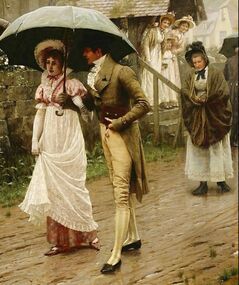 In Jane West’s The Advantages of Education, (1793) Maria Williams is the young heroine, but her mother is far more interesting. Perhaps I shouldn't define Mrs. Williams as a heroine since she does not marry at the end of the novel, but she has agency and she acts heroically. A widow with a modest income, she is loving, intelligent, prudent, upright and perceptive.
In Jane West’s The Advantages of Education, (1793) Maria Williams is the young heroine, but her mother is far more interesting. Perhaps I shouldn't define Mrs. Williams as a heroine since she does not marry at the end of the novel, but she has agency and she acts heroically. A widow with a modest income, she is loving, intelligent, prudent, upright and perceptive.Mrs. Williams's own marriage was not happy, but she stayed loyal to her husband ‘til death did them part. Her daughter's boarding school education didn't do much for her except give her vain and frivolous friends. So Mrs. Williams starts educating her at home. She trains her daughter to be well-read, domestically inclined, and benevolent, like herself.
Maria falls for Sir Henry, a handsome baronet, who (unknown to her) has already seduced and abandoned another respectable young lady. But this Willoughby-like character arouses the mother’s suspicions—why did he come into the neighbourhood under a false name? Afraid that Maria might elope with him, she manages to keep him at arm’s length, while still showing respect for her daughter’s feelings.
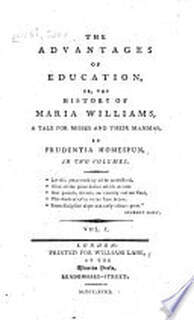 Author Jane West blends formality of language with dry sarcasm. My favourite part is when Mrs. Williams unpicks Sir Henry’s self-serving lies. He claims he's using a false identity because he needs to clear his good name from some unjust accusations, the details of which he is not at liberty to relate.
Author Jane West blends formality of language with dry sarcasm. My favourite part is when Mrs. Williams unpicks Sir Henry’s self-serving lies. He claims he's using a false identity because he needs to clear his good name from some unjust accusations, the details of which he is not at liberty to relate.“Mrs. Williams expressed her surprise, that the pain of injured honor which he appeared so strongly to feel, would allow him to employ his thoughts or time, on any object but its vindication.” (So why are you hanging around my daughter?).
She then suggests that he owes it to himself and his family to look elsewhere for a wife: “Permit me to plead the cause of that family, of whose honour and splendour you have confessed yourself to be so tenacious… Ladies, whose high birth merit your alliance, may, I doubt not, be found, who, to all Maria’s good qualities, can unite the essential requirements which she [doesn't have], I mean rank and fortune… “
Sir Henry protests that he only wants the lovely Maria, and hang rank and fortune, but he is unable to marry openly. His old uncle, who controls his inheritance, won’t allow it – but that uncle will soon be dead, so really, there is nothing to wait for.
“I will not presume to dictate your line of conduct,” Mrs. Williams answers, “but I feel it inconsistent with my own notions of honour, to encourage your addresses, while you urge the necessity of mystery and concealment.”
Sir Henry impulsively promises to get his uncle’s permission. (There is no uncle, and he plans to bring in an imposter and hold a fake marriage ceremony.)
“But pray, sir, in what part of England does this gentleman reside?”
“He generally spent his time in travelling, and seldom stayed long in any place.”
“Indeed, that restlessness of disposition is rather extraordinary, when we consider his age and infirmities.”
Sir Henry, a little embarrassed, answered, “that such a method of life was prescribed by his physicians.”
“His illness then must be of a different kind to those complaints with which old people are generally troubled…”
Before long, Sir Henry is exposed, and Maria marries a worthier man. Unlike Jane Austen, Jane West often dropped editorial comments in her novels. Paula Byrne says "the fact that [Austen] despised the reactionary Jane West is a sign that Austen herself was no reactionary." West had no hesitation in opining about many subjects, including the West Indies, and we'll return to that next month.
Another striking difference for me between Austen and the others is the quality of the writing. This morning I popped open Northanger Abbey, considered to be Austen's slightest work, to confirm a quotation, and was immediately basking in the hilarious description of Isabella Thorpe's matrimonial ambitions and Catherine's naïve reactions.
Reading the works of some of Austen's contemporaries has been quite an eye-opener for me, in terms of comparing Austen's techniques as well as her characters. I’ll never look at Mary Bennet the same way again, for example, and I'll get back to that in future posts.
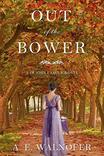 In A Marriage of Attachment, Julia Bertram, a heroine-in-waiting, actually comes to appreciate Fanny Price's virtues and she takes a more critical look at her own past selfishness. Click here for more about my Mansfield Trilogy.
In A Marriage of Attachment, Julia Bertram, a heroine-in-waiting, actually comes to appreciate Fanny Price's virtues and she takes a more critical look at her own past selfishness. Click here for more about my Mansfield Trilogy.A.E. Walnofer's Out of the Bower features two intelligent young heroines who must act for themselves. Set in the seamier side of London during the Regency period, the tale also features a red-headed hero!
Published on March 23, 2021 00:00
March 16, 2021
CMP#33 Misunderstanding
 Clutching My Pearls is about Jane Austen and the times she lived in. Click here for the first in the series. Willfully to misunderstand
Clutching My Pearls is about Jane Austen and the times she lived in. Click here for the first in the series. Willfully to misunderstand
 Darcy and Elizabeth get it sorted out What keeps Darcy and Elizabeth apart for most of Pride & Prejudice? Pride on his side, and prejudice on hers. Early on in their acquaintance, there is this exchange:
Darcy and Elizabeth get it sorted out What keeps Darcy and Elizabeth apart for most of Pride & Prejudice? Pride on his side, and prejudice on hers. Early on in their acquaintance, there is this exchange:“Implacable resentment is a shade in a character." [says Elizabeth] "But you have chosen your fault well. I really cannot laugh at it. You are safe from me.”
“There is, I believe, in every disposition a tendency to some particular evil—a natural defect, which not even the best education can overcome.”
“And your defect is to hate everybody.”
“And yours,” he replied with a smile, “is willfully to misunderstand them.”
And even when pride and prejudice are cleared away, there still a little delay caused by residual embarrassment and doubt. Once they are happily engaged, Elizabeth asks Darcy about it:
“What made you so shy of me, when you first called, and afterwards dined here? Why, especially, when you called, did you look as if you did not care about me?”
“Because you were grave and silent, and gave me no encouragement.”
“But I was embarrassed.”
“And so was I.”
“You might have talked to me more when you came to dinner.”
“A man who had felt less, might.”
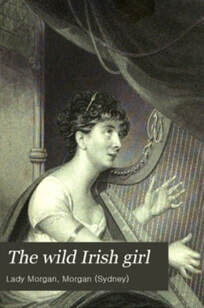 As John Mullan explains in this BBC podcast, "we all adore Elizabeth Bennet and one of the reasons we like her is that she gets things wrong... and it's not that she gets things wrong because she's been tricked. I think in a normal novel written in the late 18th or early 19th century, a heroine could make mistakes but only if she was tricked. She couldn't make mistakes because she was self-deluding or intemperate..."
As John Mullan explains in this BBC podcast, "we all adore Elizabeth Bennet and one of the reasons we like her is that she gets things wrong... and it's not that she gets things wrong because she's been tricked. I think in a normal novel written in the late 18th or early 19th century, a heroine could make mistakes but only if she was tricked. She couldn't make mistakes because she was self-deluding or intemperate..."In previous posts I talked about the plot tropes of death and coincidence. Death was useful for starting a book with an orphaned heroine, and coincidence was handy for wrapping things up at the end. In between death and coincidence, there is misunderstanding.
There were many ways of keeping an 18th century hero and heroine apart, of course – tricks such as purloined letters, untoward circumstances such as cruel guardians, secrets such as a prior engagement (as with Sense & Sensibility). But often, the plot called for misunderstanding. In Clarentine, as I’ve mentioned, the Big Problem is that Clarentine and the hero are kept apart by the machinations of an attractive widow. The misunderstanding is cleared up easily, but not quickly. In Evelina, the inexperienced heroine makes social blunders which cast her in a bad light – but once the hero gets to know her better, he realizes she is a sweet and virtuous girl.
Horatio, the hero in The Wild Irish Girl (1807), sees Glorvina, the girl he loves, reading a letter and he assumes the worst: “The ardent kiss impressed upon the senseless paper, which thy breast enshrined!!! Was the letter of a friend thus treasured? When was the letter of a friend thus answered with tears, with smiles, with blushes, and with sighs? This, this is love’s own language… " Horatio fears Glorvina loved someone else before him: “What! I to receive to my heart the faded spark, while another has basked in the vital flame! I contentedly gather this after-blow of tenderness, when another has inhaled the very essence of the nectareous blossoms? No!”
It's all a big misunderstanding of course, which leads to more purple prose and a dramatic wedding interruption scene where the truth is revealed. Luckily Glorvina, who faints repeatedly and runs mad, has a "fine constitution" and she recovers for her happy ending.
In Camilla, the hero’s friend Dr. Marchmont poisons the hero’s mind against the heroine. Jane Austen laughingly refers to Camilla in a letter to her sister: "Give my Love to Mary Harrison, & tell her I wish whenever she is attached to a young Man, some respectable Dr. Marchmont may keep them apart for five Volumes.
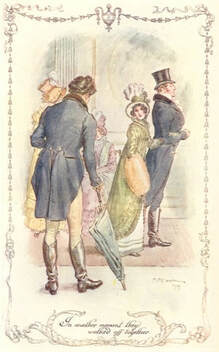 Some people who have looked closely at the plot of Persuasion have wondered whether Austen was initially planning to extend the estrangement caused by Wentworth's jealousy of Mr. Elliot a little longer. There is the scene where Charles Musgrove buys tickets for the theatre, but Mary exclaims: "Have you forgot that we are engaged to Camden Place to-morrow night?" Austen doesn't make much use of this conflict, and nothing comes of the revelation that William Elliot was in Bath, meeting with Mrs. Clay, when he was supposedly out of town. Scholar Ellen Moody has suggested that "since Anne did not have an opportunity to tell Lady Russell the truth about Mr. Elliot, we were to have a Tuesday of intense mortification and reversal for both Anne Elliot and Frederick Wentworth (either at a card party organized by Lady Russell, or a gathering at a performance of a play bought by Charles for a Tuesday evening in Bath)."
Some people who have looked closely at the plot of Persuasion have wondered whether Austen was initially planning to extend the estrangement caused by Wentworth's jealousy of Mr. Elliot a little longer. There is the scene where Charles Musgrove buys tickets for the theatre, but Mary exclaims: "Have you forgot that we are engaged to Camden Place to-morrow night?" Austen doesn't make much use of this conflict, and nothing comes of the revelation that William Elliot was in Bath, meeting with Mrs. Clay, when he was supposedly out of town. Scholar Ellen Moody has suggested that "since Anne did not have an opportunity to tell Lady Russell the truth about Mr. Elliot, we were to have a Tuesday of intense mortification and reversal for both Anne Elliot and Frederick Wentworth (either at a card party organized by Lady Russell, or a gathering at a performance of a play bought by Charles for a Tuesday evening in Bath)." I’ve always been struck by the passage in Persuasion where Anne is musing on the likelihood that Wentworth does love her, after all: "She tried to be calm, and leave things to take their course, and tried to dwell much on this argument of rational dependence: --'Surely, if there be constant attachment on each side, our hearts must understand each other ere long. We are not boy and girl, to be captiously irritable, misled by every moment's inadvertence, and wantonly playing with our own happiness.’" It's as though Austen has considered, but rejected, spinning out any further misunderstandings between these two rational adults.
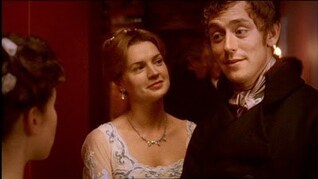 In comparing Austen’s novels with those of her contemporaries, we can see she was fully aware of how to use death, coincidence and misunderstanding, She even lampoons the sibling-mistaken-for-lover trope in Northanger Abbey when Catherine spots Henry at a ball “talking with interest to a fashionable and pleasing-looking young woman” who Catherine “immediately guessed to be his sister; thus unthinkingly throwing away a fair opportunity of considering him lost to her forever… and therefore, instead of turning of a deathlike paleness and falling in a fit on Mrs. Allen’s bosom, Catherine sat erect, in the perfect use of her senses, and with cheeks only a little redder than usual.”
In comparing Austen’s novels with those of her contemporaries, we can see she was fully aware of how to use death, coincidence and misunderstanding, She even lampoons the sibling-mistaken-for-lover trope in Northanger Abbey when Catherine spots Henry at a ball “talking with interest to a fashionable and pleasing-looking young woman” who Catherine “immediately guessed to be his sister; thus unthinkingly throwing away a fair opportunity of considering him lost to her forever… and therefore, instead of turning of a deathlike paleness and falling in a fit on Mrs. Allen’s bosom, Catherine sat erect, in the perfect use of her senses, and with cheeks only a little redder than usual.”Austen strove to avoid clichés and improbabilities in her novels. She uses misunderstandings, but she doesn't extend them to implausible length. No Austen heroine behaves with the maddening obtuseness of Clarentine, for example. There is a comic misunderstanding in Sense & Sensibility when Mrs. Jennings briefly thinks that Colonel Brandon is proposing to Elinor. Marianne hopes that some misunderstanding can explain Willoughby's behavior, but she can't deceive herself for long.
We find self-delusion more than misunderstanding in Austen's novels. Edmund Bertram deludes himself that Mary Crawford can't possibly be as cynical and worldly as she appears to be. Marianne deludes herself that Willoughby is the ideal romantic hero, when the real hero, Colonel Brandon, is right under her nose. And Emma deludes herself over Mr. Elton's marital intentions. She comes out of that debacle to set up another misunderstanding between herself and Harriet over which admirer of Harriet's they have agreed not to talk about.
This capacity for self-delusion, John Mullan suggests, was an innovation by Austen. It made her heroines more real, more three-dimensional, more believable, than heroines who were "pictures of perfection."
It seems I have some more notes about 18th century heroines to share. Were there some heroines who were actually rational creatures?
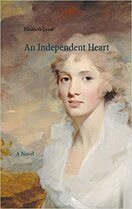 Elizabeth Grant’s historical novel
The Independent Heart
eschews 18th century plot contrivances in favor of a psychological barrier. We have a kind and enlightened hero paired with an attractive, well-educated, intelligent, heroine. The hero comes to love and respect her. The problem keeping them apart is a hidden trauma which is gradually revealed, not a misunderstanding. This is a romance novel for grown-ups.
Elizabeth Grant’s historical novel
The Independent Heart
eschews 18th century plot contrivances in favor of a psychological barrier. We have a kind and enlightened hero paired with an attractive, well-educated, intelligent, heroine. The hero comes to love and respect her. The problem keeping them apart is a hidden trauma which is gradually revealed, not a misunderstanding. This is a romance novel for grown-ups. In my novel A Contrary Wind, I admit that I made use of the purloined letter. Several, in fact. Click here for more about my books.
Published on March 16, 2021 00:00
March 9, 2021
CMP#32 Coincidence
 Click here for the first in my series, Clutching my Pearls
Click here for the first in my series, Clutching my PearlsDeath and Coincidence, part two One of my favourite passages from Austen’s juvenilia is the scene in Love and Freindship when Lord St. Clair, alighting at an inn, encounters four of his long-lost grandchildren within a few moments of each other. This scene is Austen’s send-up of a common scenario in 18th century novels – the amazing coincidence which reunites long-separated siblings or friends.
In my previous post, I talked about how death solved a lot of plot conflicts for 18th century authors. So much so, that by the time I got to the fifth volume of Sarah Burney’s Traits of Nature, I was wondering, okay, is the author going to resolve her story with death or with coincidence? The inconvenient first wife has already died, do we need to clear off the disapproving father as well? No, we went with the amazing coincidence, or “isn’t this a small world” route. After Adela's brother falls in love with the sister of the man she loves, it's a happy ending for everybody.
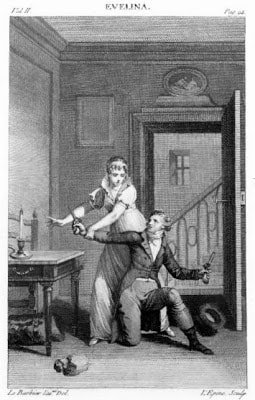 Evelina stops a stranger from doing something desperate In Fanny Burney’s Evelina, the heroine impulsively goes to the aid of an impoverished Scottish poet, who turns out to be her half-brother. Burney’s sister Sarah Burney gave us Clarentine, who assists a destitute refugee from the French Revolution, who turns out to be her aunt. Adela, mentioned above, also bumps into an old childhood friend who has fallen on hard times, and his landlady's friend just happens to be the gigolo who married her disgrmother.
Evelina stops a stranger from doing something desperate In Fanny Burney’s Evelina, the heroine impulsively goes to the aid of an impoverished Scottish poet, who turns out to be her half-brother. Burney’s sister Sarah Burney gave us Clarentine, who assists a destitute refugee from the French Revolution, who turns out to be her aunt. Adela, mentioned above, also bumps into an old childhood friend who has fallen on hard times, and his landlady's friend just happens to be the gigolo who married her disgrmother. Charlotte Smith’s orphan heroine Clementine doesn’t know who her parents are, but the mystery is solved when the man she loves gets lost in the Pyrenees. He stumbles into the only peasant cottage in all of Europe where he could learn the answer to the mystery. Clementine is in fact the daughter of a blue-blooded French nobleman.
In Maria Edgeworth’s Belinda, we meet Virginia, a beautiful, innocent, artless, girl. She is a secret ward of the hero; he has financially supported her ever since she was left alone in the world. The hero intends to marry her in time, but she is infatuated with a picture of a handsome young lieutenant. Well, what do you know: thanks to a string of amazing coincidences, we find the mystery man and her missing father (and dad's rich!) and everyone gets married to the person they really love.
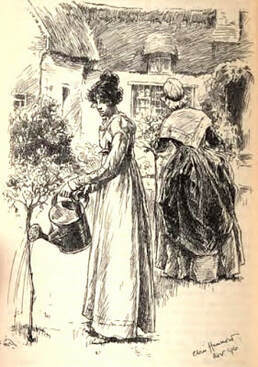 The artless, innocent Virginia in Belinda Compare Clementine and sweet, artless, Virginia with Harriet Smith in Emma. Emma befriends Harriet, a “parlour boarder” at the local girls’ school, the natural daughter of somebody. Emma convinces herself that the beautiful, sweet-tempered girl must be of good family, possibly even of the nobility, and encourages her to set her sights high when choosing a husband. The prosaic truth is revealed when she gets engaged. "She proved to be the daughter of a tradesman, rich enough to afford her the comfortable maintenance which had ever been hers, and decent enough to have always wished for concealment." There is no romance, no significant birthmark, no amazing twist of fortune and most of all, no astounding coincidence.
The artless, innocent Virginia in Belinda Compare Clementine and sweet, artless, Virginia with Harriet Smith in Emma. Emma befriends Harriet, a “parlour boarder” at the local girls’ school, the natural daughter of somebody. Emma convinces herself that the beautiful, sweet-tempered girl must be of good family, possibly even of the nobility, and encourages her to set her sights high when choosing a husband. The prosaic truth is revealed when she gets engaged. "She proved to be the daughter of a tradesman, rich enough to afford her the comfortable maintenance which had ever been hers, and decent enough to have always wished for concealment." There is no romance, no significant birthmark, no amazing twist of fortune and most of all, no astounding coincidence.Austen’s plots do have some coincidences. In Emma, we have Frank Churchill and Jane Fairfax meeting in a seaside resort, and –coincidence -- it turns out they both originally hailed from the same small English town. However, this initial meeting takes place off-stage; there are no reports of the dialogue between Frank and Jane to remind us of it (Oh, your father lives in Highbury! So does my aunt! Small world!). The even-more-fortuitous happening is a coincidental death -- the disagreeable Mrs. Churchill dies just when she should: Austen leans into this coincidence and has Mr. Knightley remark upon Frank Churchill’s extraordinary luck: “Frank Churchill is, indeed, the favourite of fortune. Every thing turns out for his good… His aunt is in the way.—His aunt dies.”
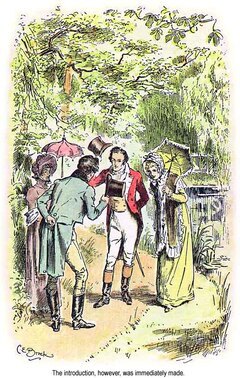 So Austen was not so different from her contemporaries in using death and coincidence. The difference is that she was more artful with it and she didn't push the bounds of improbability past the breaking point, as with Belinda. Her fresh and unique touch distracts us from noticing certain improbable coincidences. She leans into the connection between Mr. Collins, Lady Catherine DeBourgh and Mr. Darcy. We learn about the connection between Mr. Darcy and Lady Catherine from Mr. Collins; he is the first to mention it when he sees Mr. Darcy at the Netherfeld Ball. Elizabeth would never have married Mr. Darcy had he not fallen irrevocably in love with her while she was visiting Charlotte Collins. Other novelists might have had Darcy stride into Lady Catherine’s drawing room, surprising and confusing Lizzy. (What, ma'am, this is your nephew?).
So Austen was not so different from her contemporaries in using death and coincidence. The difference is that she was more artful with it and she didn't push the bounds of improbability past the breaking point, as with Belinda. Her fresh and unique touch distracts us from noticing certain improbable coincidences. She leans into the connection between Mr. Collins, Lady Catherine DeBourgh and Mr. Darcy. We learn about the connection between Mr. Darcy and Lady Catherine from Mr. Collins; he is the first to mention it when he sees Mr. Darcy at the Netherfeld Ball. Elizabeth would never have married Mr. Darcy had he not fallen irrevocably in love with her while she was visiting Charlotte Collins. Other novelists might have had Darcy stride into Lady Catherine’s drawing room, surprising and confusing Lizzy. (What, ma'am, this is your nephew?). The Gardiners were going to take Lizzy with them to the Lakes, but "they were obliged to give up the Lakes, and substitute a more contracted tour, and... were to go no farther northwards than Derbyshire... to Mrs. Gardiner it had a peculiarly strong attraction." The fact that they weren't initially planning to go to Derbyshire seems to cover up the coincidence that they end up at Pemberley. Still, Elizabeth travels in two different directions from her home town, and each time, she meets up with the same man. England is not a large country, but this is still something of a stretch.
I will close with professor John Mullan: "Mediocre novelists try to avoid coincidences; better writers embrace them. Some of the greatest works of fiction turn on coincidences that no jobbing novelist would dare perpetrate. In Jane Eyre, for instance, the heroine, fleeing Rochester's house in a kind of panic, travels blindly across England before collapsing unconscious at the door of an isolated house in an unknown place. The inhabitants who take her in turn out to be her long-lost cousins."
Mullan says: "Novelists need to have the courage of their coincidences." Some Austen devotees have speculated that Harriet Smith is Miss Bates’s secret love child, because Miss Bates’s first name is also Harriet, though she is referred to as “Hetty.” I frankly think this is silly and a slur upon Miss Bates’s virtue. It's fair game to take the story in whatever direction you want for a JAFF variation, but I can't believe Austen would conceal a secret like this and not reveal it in a book that's filled with secrets that are revealed in the end.
Author Allie Creswell does show us the meeting of Frank Churchill and Jane Fairfax in Weymouth along with lots of Bates family backstory in her Highbury Trilogy. Her story-telling is authentically Austenesque in tone and she stays within canon.
Published on March 09, 2021 00:00
March 1, 2021
CMP#31 Death and Coincidence, part 1
 Clutching My Pearls
is about my take on Jane Austen.
Click here
for the first in the series. Death and Coincidence, part one
Clutching My Pearls
is about my take on Jane Austen.
Click here
for the first in the series. Death and Coincidence, part one
 The widowed Mr. Elliot in mourning black, Persuasion The 1796 Monthly Review quotes Dr. Johnson on the novelist’s difficulties around coming up with new but plausible plots: “every man who has tried knows how much labour it will cost to form such a combination of circumstances as shall have at once the grace of novelty and credibility, and delight the fancy, without violence to reason.”
The widowed Mr. Elliot in mourning black, Persuasion The 1796 Monthly Review quotes Dr. Johnson on the novelist’s difficulties around coming up with new but plausible plots: “every man who has tried knows how much labour it will cost to form such a combination of circumstances as shall have at once the grace of novelty and credibility, and delight the fancy, without violence to reason.” In an earlier post, I discussed the theory that Sense & Sensibility was written as a protest against primogeniture – the practice of giving the entire estate to the oldest son, while the other sons and daughters received much less, if anything. The novel begins with the death of old Uncle Dashwood, followed a paragraph later by the death of his son and heir, and soon the Dashwood sisters and their widowed mother are out the door with nothing much besides the best breakfast china set.
I’ve already discussed (and rejected) the suggestion that Austen invented this plot point specifically as a protest against primogeniture. But really, we ought to look around us and ask – was Austen unique in featuring death and inheritance in her plots? Do her novels stand out from her contemporaries in this respect? Was this an improbable or controversial "combination of circumstances"?
Well, one thing I can tell you after a swift survey of authors whom Austen is known to have read, the answer is – 18th novels depended heavily on death and coincidence for their plots. The deaths of parents and guardians in the first chapter (usually as backstory) gives us the isolated, forsaken, disinherited heroine who must battle through tribulations and misunderstanding. And coincidence gives us situations where characters meet or reunite under remarkably improbable circumstances. More on coincidence later, let’s do death first, because it is amazing how many novels start with death and rely upon death.
 Consumption, Richard Tennant Cooper Did it do "violence to reason" to start a story with a lot of death? There’s a good quip on Twitter about how, in this age of COVID, we start our emails 18th century style, with, “I hope this message finds you well.” All the convenient deaths in these novels might strike us as being improbable outside of a murder mystery. But it is not that far removed from the reality of Austen’s time.
Consumption, Richard Tennant Cooper Did it do "violence to reason" to start a story with a lot of death? There’s a good quip on Twitter about how, in this age of COVID, we start our emails 18th century style, with, “I hope this message finds you well.” All the convenient deaths in these novels might strike us as being improbable outside of a murder mystery. But it is not that far removed from the reality of Austen’s time.Every day was COVID 19 day and worse, in Regency England. No cures for appendicitis, diabetes, most cancers, or tuberculosis. (Tuberculosis – aka consumption, aka wasting Victorian heroine disease, killed millions). There was nothing unusual about starting a novel with – “the first wife died, and the old uncle was childless, and the heir died a year after inheriting, and so the Dashwood girls were left almost portionless.” Marianne, Elinor and Margaret were lucky to have escaped with their mother alive and well.
In Sarah Burney’s Clarentine , the ranks are thinned without mercy: In the first few chapters, we lose Clarentine’s mother, her aunt, her father, her uncle, her French uncle and the Earl of Welwyn’s heir. In Charlotte Smith's Emmeline, or the Orphan of the Castle, a younger brother inherits an estate when Emmeline's father dies, and the surviving brother's wife is the heir to her family's estate when her two brothers die. Oh, and Emmeline's mom died too.
Is all this slaughter a way of protesting primogeniture? Or is the author setting up her chess pieces on the board, and knocking half of them off, so she is left with the pieces she wants to put in play? Maria Williams in The Advantages of Education is left behind with a guardian when her parents go to the West Indies. The guardian dies, without leaving her the promised inheritance, and mother returns but the father is dead, which are all a necessary preliminaries to making the mother the head of the household, the driver of the action, but too poor to mingle in high society. Likewise, the Dashwood girls' predicament wouldn't be so poignant if they had the independence which comes from having a hefty inheritance. You'd have a quite a different novel indeed.
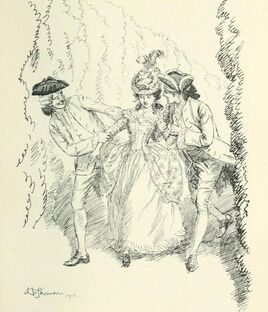 Evelina being harassed A heroine cannot be vulnerable and persecuted when she has protectors, so they have to go, like the red-shirted crew member assigned to the away team in a Star Trek episode. By the end of the first chapter Emmeline, the orphan of the forest, loses the faithful servants who looked after her. Fanny Burney’s Evelina takes us through two generations of unhappy marriage and untimely death, to give us our unprotected beauty, a lamb amongst wolves. “Would to heaven,” she cries, after being mauled yet again by a lecherous admirer, “that I, too, had a brother! – and then I should not be exposed to such treatment.”
Evelina being harassed A heroine cannot be vulnerable and persecuted when she has protectors, so they have to go, like the red-shirted crew member assigned to the away team in a Star Trek episode. By the end of the first chapter Emmeline, the orphan of the forest, loses the faithful servants who looked after her. Fanny Burney’s Evelina takes us through two generations of unhappy marriage and untimely death, to give us our unprotected beauty, a lamb amongst wolves. “Would to heaven,” she cries, after being mauled yet again by a lecherous admirer, “that I, too, had a brother! – and then I should not be exposed to such treatment.”Heroes could lose their parents too; it was a dereliction of family duty to leave your widowed mother home alone without a companion, Charles, the bachelor in Coelebs in Search of a Wife, can’t go in search of a wife until mom dies -- so she promptly does.
I haven't seen any authors – including Austen – who editorialize against the inheritance laws (but I'll update this if I find any examples. And I'm talking about the laws, not characters who complain that they wish so-and-so would die and give them an inheritance.) Authors, including Austen, do give us selfish, neglectful, or spendthrift ancestors, but there is no editorial voice tugging at the reader’s sleeve to say, “This wouldn’t have happened in France, where they abolished primogeniture.” Death and disinheritance appears -- to me anyway -- to be a plot device, not a social commentary.
Given the dramatic possibilities of the friendless heroine, perhaps the real wonder is that so many of Austen’s parents managed to evade the grim reaper: Emma Watson is the only heroine who loses both parents, (that is, Austen family lore tells us that Mr. Watson was to die, but Austen never finished The Watsons). Instead, Austen separates her heroines from their parents by sending them on journeys – the Dashwood girls go to London, Elizabeth Bennet to Kent and Derbyshire, Catherine Morland to Bath. (Emma, of course, never goes anywhere.) Fanny Price leaves Portsmouth and later, she learns you can't go home again.
As well, Austen's heroines are not as friendless and helpless as Emmeline and Evelina, although Catherine Morland is innocent as a lamb and Fanny Price is isolated without being an orphan. I've written elsewhere about how Austen's heroines are psychologically isolated.
Another difference is that many heroes and heroines of 18th and 19th century literature get an unexpected windfall inheritance, such as Grace Nugent in Maria Edgeworth's The Absentee. Jane Eyre gets her windfall from her mother's brother. In Anthony Trollope’s Dr. Thorne, Mary Thorne is barely acceptable in society because of her dubious parentage. But she becomes a very eligible bride when she inherits her uncle's riches. Austen doesn't use this trope. While some of Austen's heroines marry very well, they don't get a surprise bequest from a distant relative.
Mrs. Churchill's death in Emma is quite fortuitous for Frank Churchill and Jane Fairfax; we'll revisit her sudden demise when we look at coincidence. And down the road, we'll have to look at misunderstandings -- those pesky misunderstandings which keep the hero and heroine apart. Click here for a useful run-down of myths about English inheritance laws. Yes, women could inherit.
Author Rose Servitova spares Mr. Watson's life in her elegantly-crafted completion of The Watsons.
When I brought Mansfield Park's Mary Crawford to Italy to meet the poet Percy Bysshe Shelley, she was delighted to learn he was the heir to a baronetcy. Click here for more about my novella, Shelley and the Unknown Lady, which is based on a true literary mystery. Some Austen characters from Mansfield Park meet an untimely end in my Mansfield Trilogy.
Published on March 01, 2021 00:00
February 23, 2021
CMP# 30 In Praise of Brusque But Kindly Widows
 Clutching My Pearls is about Jane Austen and the times she lived in. Click here for the first in the series.
Clutching My Pearls is about Jane Austen and the times she lived in. Click here for the first in the series. In Praise of Brusque But Kindly Widows “My dearest Clarentine, you are always either upon crutches or upon stilts!” -- Mrs. Denbigh
 In the last post, I discussed Austen scholar Mary Waldron’s thesis that Fanny Price is not a perfect heroine because she falls short of her own Christian ideals. Waldron suggests Sarah Burney’s Clarentine, who I have also discussed previously, as an example of a "perfect" heroine,
In the last post, I discussed Austen scholar Mary Waldron’s thesis that Fanny Price is not a perfect heroine because she falls short of her own Christian ideals. Waldron suggests Sarah Burney’s Clarentine, who I have also discussed previously, as an example of a "perfect" heroine, Waldron says Clarentine is a girl who, “despite temptations, never deviates, even in thought, from the accepted path of right conduct.”
While “pictures of perfection” heroines in Georgian literature were a thing, I don’t agree that Clarentine is one of them. It’s not just that, by modern standards, she is ridiculous. It is that there are a sensible people within the novel who can see she is being ridiculous.
Clarentine, like Fanny Price, manages to make timidity look like hauteur. When Clarentine goes to live with her guardian’s old tutor, she trembles as she descends from the carriage: Clarentine’s heart failed her as the moment drew near that was destined to introduce her to the strangers she was henceforward to reside with… she stopped at the bottom of the steps and said with a half smile – 'It is very foolish, but indeed, Mr. Lenham, I am almost afraid of venturing farther.'
Mr. Lenham laughed at her apprehensions, yet with great kindness said –
'Shall I go in first then, and announce your arrival?'
Glad of any reprieve [Clarentine] eagerly accepted the proposal, and struggling to gain courage during his absence, was able when he returned to accompany him onto the room with tolerable composure. So our heroine is timid and all that, but she sees no issue with making old Mr. Lenham, whom she has just met, announce her like she was a Duchess or something.
And may I suggest, dear reader, that only very pretty girls can get away with this kind of crap? Anyway…
 We don't see Fanny Price or Clarentine struggling against temptation in the sense of wanting to do something they know is wrong. With the minor exception of agreeing to help with the play at Mansfield, nothing tempts Fanny, and she yields through peer pressure. Clarentine likewise is not tempted to misbehave, because all forms of misbehavior repulse her. For example, she rejects the gaudy pleasures of London. These heroines would be more interesting and sympathetic to us if we did see them struggle with temptation.
We don't see Fanny Price or Clarentine struggling against temptation in the sense of wanting to do something they know is wrong. With the minor exception of agreeing to help with the play at Mansfield, nothing tempts Fanny, and she yields through peer pressure. Clarentine likewise is not tempted to misbehave, because all forms of misbehavior repulse her. For example, she rejects the gaudy pleasures of London. These heroines would be more interesting and sympathetic to us if we did see them struggle with temptation. Fanny is described as struggling against low spirits and sometimes jealousy, as does Clarentine. Mr. Lenham, seeing her melancholy state, (and no doubt tired of having a moody teenager moping around the house) begs her to confide in him, but she protests, “mine is a secret that ought not to be told.”
“You amaze me,” [Mr. Lenham] cries. “What secret can be deposited in a heart so guileless and so pure as your’s, that you need blush to reveal?”
“Alas, Sir!” exclaimed Clarentine, sighing, “how little you suspect the state of that heart you seek thus benevolently to penetrate. It is filled at this moment with every evil passion. Pride, resentment, envy and ingratitude, assail it by turns; and, oh, Sir, assail it so forcibly, that I know now how to repel them!”
When her secret love for her guardian causes Clarentine to fall ill, her neighbor Mrs. Denbigh upbraids her and advises her to get over herself: "Is your case, my young friend, a new one? Oh no! – how many notable and contented old women there now are, attending daily to the domestic occupations of their household, scolding their maids, whipping their children, snarling at their husbands, and sitting in judgment upon their neighbours, who once, like you, were sunk in listlessness and apathy, and thought no pleasure equal to that of elegantly indulging their romantic despondence!”
Clarentine protests that, given her situation as a friendless, dependent orphan suffering the pangs of unrequited love, it is only natural that she should be sunk in misery, but the brusque but kindly Mrs. Denbigh interrupts: “A fatal tendency to encourage causeless repinings seems to have been your bane through life.”
 Throughout the last volume of the novel, Mrs. Denbigh is the voice of reason, trying to persuade Clarentine to moderate her hysterical vaporings. As a character, she plays a valuable role in the novel. We see our sentimental heroine through her eyes, the eyes and viewpoint of a rational person. That got me thinking about Austen’s heroines and the structure of Austen's novels. In the previous post, I mentioned C.S. Lewis’s essay, “A Note on Austen” in which he contrasts Elizabeth Bennet, Catherine Morland, Marianne Dashwood, and Emma Woodhouse with Fanny Price and Anne Elliot. The first four heroines are wrong about something. And they all have someone who tells them they are wrong (although of course they acknowledge, and regret, their errors themselves.) Emma has Mr. Knightley. Marianne has Elinor. Catherine is brought down to earth by Henry Tilney.
Throughout the last volume of the novel, Mrs. Denbigh is the voice of reason, trying to persuade Clarentine to moderate her hysterical vaporings. As a character, she plays a valuable role in the novel. We see our sentimental heroine through her eyes, the eyes and viewpoint of a rational person. That got me thinking about Austen’s heroines and the structure of Austen's novels. In the previous post, I mentioned C.S. Lewis’s essay, “A Note on Austen” in which he contrasts Elizabeth Bennet, Catherine Morland, Marianne Dashwood, and Emma Woodhouse with Fanny Price and Anne Elliot. The first four heroines are wrong about something. And they all have someone who tells them they are wrong (although of course they acknowledge, and regret, their errors themselves.) Emma has Mr. Knightley. Marianne has Elinor. Catherine is brought down to earth by Henry Tilney.In each of these novels, there are conversations (or a letter, in the case of Pride & Prejudice) where the heroine is told she is wrong.
But there are no such conversations in Mansfield Park. On the contrary, the people who tell Fanny she is wrong, are wrong themselves. Edmund hopes Henry Crawford will “succeed at last” in winning her hand: “You have proved yourself upright and disinterested, prove yourself grateful and tender-hearted; and then you will be the perfect model of a woman which I have always believed you born for.” Sir Thomas thinks she turned down Henry Crawford because she is "willful and perverse." He’s very wrong about her character and her motives. And everyone is wrong about the Crawfords, and Fanny is eventually vindicated.
In Mansfield Park, there is only the merest hint that Fanny has created some of her own problems, or made them worse, because of her temperament: “As usual, believing yourself unequal to anything! fancying everything too much for you!" Edmund exclaims at one point. Here, Fanny compares herself with her younger sister: “Susan was only acting on the same truths, and pursuing the same system, which her own judgment acknowledged, but which her more supine and yielding temper would have shrunk from asserting. Susan tried to be useful, where she [Fanny] could only have gone away and cried.”
The narrator makes essentially the same point during the wrapping-up: when Susan (lucky girl!) is established at Mansfield as Lady Bertram’s unpaid companion: “Her more fearless disposition and happier nerves made everything easy to her there. With quickness in understanding the tempers of those she had to deal with, and no natural timidity to restrain any consequent wishes, she was soon welcome and useful to all…” (And, to be fair, no Mrs. Norris to cope with).
Fanny's timidity is referred to as a fact, more than as a fault, it seems to me.
Poor Fanny does not have a Mrs. Denbigh in her life, and she could use one. In my variation on Mansfield Park, A Contrary Wind, I did supply Fanny with a foil, and it just so happens that it is a brusque but kindly widow.
Speaking of timidity, here is a sharp and funny critique from Dorothea Sofia-Rossellini, an Australian Janeite author, concerning Fanny Price: “Lord, what a self-absorbed little wimp she was… Fanny, of Mansfield Park, really was constitutionally incapable of girding her loins and slaying the serpent that had entered her family home – I mean… she was, quite simply, so maidenly that she truly couldn’t so much as indicate that serpent’s hiding place (in Mr. Crawford’s trousers). She is so enchantingly frail that she cannot choose but to shrink away to the East Room – while the happiness, the honour, the very social existence of the family which had brought her up in comfort and health, all went to hell in a handbasket.”
Dorothea Sofia-Rosselini's variation on Persuasion is witty, daring and whimsical, a quite unique variation of Jane Austen fan fiction for die-hard Austenites. I'm glad to see it's now available in ebook, too.
Published on February 23, 2021 00:00
February 16, 2021
CMP#29 The Faults of Fanny
 Clutching My Pearls is about Jane Austen and the times she lived in. The opinions are mine, but I don't claim originality. Much has been written about Austen. Click here for the first in the series. Is Fanny Price a Picture of Perfection? Perfect heroines – sweet, guileless, innocent, virtuous – were a staple of novels in Austen’s time. Some social critics of the day believed that heroines ought to represent ideal female behaviour, lest novels set a bad example.
Clutching My Pearls is about Jane Austen and the times she lived in. The opinions are mine, but I don't claim originality. Much has been written about Austen. Click here for the first in the series. Is Fanny Price a Picture of Perfection? Perfect heroines – sweet, guileless, innocent, virtuous – were a staple of novels in Austen’s time. Some social critics of the day believed that heroines ought to represent ideal female behaviour, lest novels set a bad example. So is Fanny Price intended to be Jane Austen’s entry in the “perfect heroine” category? Is she so sweet and mild-tempered and virtuous that she's unrelatable to modern readers?
Scholar Mary Waldron says we’ve been getting Fanny – and Austen’s intentions – wrong. She says Fanny is not perfect, and is not intended to be perfect.
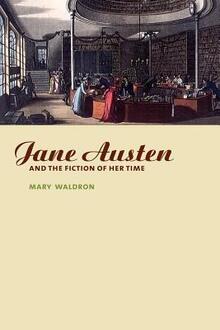 In Jane Austen and the Fiction of Her Time, Waldron says Austen’s contemporaries understood that Fanny wasn’t perfect, but since then, Fanny has come to be seen as an artistic failure. The take on Fanny is that "Austen must have been trying to create a perfectly good girl and has failed."
In Jane Austen and the Fiction of Her Time, Waldron says Austen’s contemporaries understood that Fanny wasn’t perfect, but since then, Fanny has come to be seen as an artistic failure. The take on Fanny is that "Austen must have been trying to create a perfectly good girl and has failed."For example, C.S. Lewis calls Fanny insipid. “Jane Austen has put really nothing [into Fanny’s character] except rectitude of mind; neither passion, nor physical courage, nor wit, nor resource” to counterbalance her insignificance. (By insignificance, Lewis means that Fanny is the least important person in the household, the one nobody listens to).
Waldron suggests that instead, we look at Mansfield Park “as a working through of the unresolvable conflicts facing a young woman” who tries to follow evangelical principles. While Fanny’s actions are correct, her mind is in “turmoil.” Inwardly, she is rebelling against her fate. Waldron suggests that Austen is exploring whether it is possible to be faultless, to be perfectly modest, submissive, and charitable, and to give up the man you love without an inner murmur of the heart.
So what are Fanny’s faults? Well, says Waldron, she resents Mary Crawford and is jealous of her. She cannot give Mary credit for the good, kind things she actually does. While Fanny condemns Mary for her mercenary attitudes, she herself can’t stand living in poverty in Portsmouth. She longs for the “ease, refinement and wealth” of Mansfield Park. Fanny gladly tutors her sister Susan in virtuous conduct but hypocritically refuses to give moral guidance to Henry Crawford.
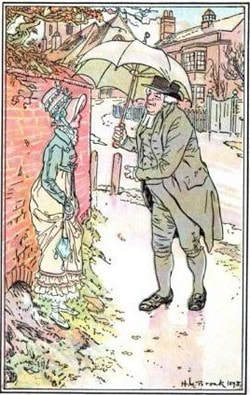 I’ll add a fault of Fanny that particularly grinds my corn: her passive-aggressive tendencies.
I’ll add a fault of Fanny that particularly grinds my corn: her passive-aggressive tendencies. When Fanny is returning from an errand, she is caught in a heavy rain shower near the parsonage. The Grants see her trying "to find shelter under the branches and lingering leaves of an oak." They send “a civil servant” to invite her in from the rain. She refuses. Austen describes this as “modest reluctance.” In other words: “No, thank you. Even though your mistress specifically sent you out here to invite me in, I can’t take her at her word--I am just too unworthy. I’ll just stand here, in plain sight of your comfortable home, in the rain. Sorry you got your feet wet for nothing.”
This means Dr. Grant (who, we recall, is indolent and selfish, and will not stir a finger for the convenience of anyone) now must get his hat and umbrella and fetch her himself. “[T]here was nothing to be done but to be very much ashamed, and to get into the house as fast as possible.”
Fanny also keeps everyone waiting when Mrs. Grant invites her to dinner. We can imagine the Grants standing there, with hospitable smiles frozen on their faces, while Fanny dithers, and looks at Edmund, and dithers some more -- and she also dithers and delays when Mary Crawford asks her to choose a necklace. Because nothing says “I am humble” like inconveniencing people who are more important than you.
For a deeper dive, here is my "Fanny vs Mary debate" with author Kyra Kramer, who likes Mary Crawford. Kyra says "Fanny bullied everyone with her timidity."
But I am not certain if Austen presents Fanny’s timidity as a virtue or a fault. That would be the key question here. What do you think, reader? And is it really modesty which makes Fanny dither in these three situations? Or is she avoiding being around Mary Crawford, and not wanting to like her, or be obliged to her? Waldron mentions the necklace incident and suggests it's the latter. Having presented Waldron’s side of the argument, I’ll turn to a counterargument, which is, if Fanny is not perfect, does she have a moment of clarity about her faults? Does she realize she’s been wrong, that she hasn’t been charitable enough towards the Crawfords? Because as C.S. Lewis points out, Austen’s four self-deluded heroines have that “a-ha” moment. Elizabeth Bennet realizes she’s misjudged both Darcy and Wickham, Emma has been wrong about everything, Catherine Norland has overdone it with the Gothic novels, and Marianne Dashwood has overindulged her romantic propensities. But Fanny Price and Anne Elliot do not have an “a-ha” moment. Anne does not concede that she was wrong to turn down Wentworth, because she was not wrong to listen to her elders. And Fanny Price is completely vindicated in Mansfield Park, while everyone else was deceived about the Crawfords.
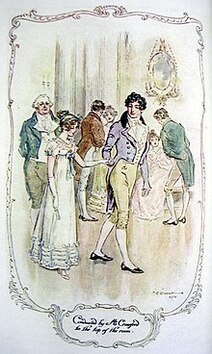 "She could hardly believe it. To be placed above so many elegant young women!" So, although Waldron almost convinced me, I’m not completely convinced. At most, I will say that Mansfield Park is a more subtle novel than the novels with perfect heroines, such as Traits of Nature and Self-Control and Coelebs in Search of a Wife. The characters are real, not caricatures, neither all good or all bad, but all brilliantly depicted. Lady Bertram doesn’t mean any harm, but she causes harm through her indolence. Mary Crawford’s genuine respect for Edmund and Fanny did not prevent her from writing to Fanny and saying she hopes Tom will die so Edmund can inherit. Henry Crawford’s redemption balances upon a knife’s edge. He could have gone home to his estate, but his own vanity demanded that he stay in London and bring Maria to heel. Even upright intelligent people like Edmund can be seduced into ignoring their own principles, and find reasons for excusing behaviour they would otherwise disapprove of. These are all very human failings, which lead to disastrous outcomes and a less-than-happy ending at Mansfield.
"She could hardly believe it. To be placed above so many elegant young women!" So, although Waldron almost convinced me, I’m not completely convinced. At most, I will say that Mansfield Park is a more subtle novel than the novels with perfect heroines, such as Traits of Nature and Self-Control and Coelebs in Search of a Wife. The characters are real, not caricatures, neither all good or all bad, but all brilliantly depicted. Lady Bertram doesn’t mean any harm, but she causes harm through her indolence. Mary Crawford’s genuine respect for Edmund and Fanny did not prevent her from writing to Fanny and saying she hopes Tom will die so Edmund can inherit. Henry Crawford’s redemption balances upon a knife’s edge. He could have gone home to his estate, but his own vanity demanded that he stay in London and bring Maria to heel. Even upright intelligent people like Edmund can be seduced into ignoring their own principles, and find reasons for excusing behaviour they would otherwise disapprove of. These are all very human failings, which lead to disastrous outcomes and a less-than-happy ending at Mansfield.And Fanny, while very moral, has a "supine and yielding temperament." Again, is this intended to be a fault, or a virtue, or just Fanny being Fanny? Next post: the advantages of having a brusque old widow in your life... C.W. Lewis's brief essay "A Note on Jane Austen" is not available on the 'Net, but is well worth seeking out. If you can't read enough about Fanny Price, I've got more links at my Jane Austen page to some thoughtful stuff on the Web.
I could see why Mary Crawford would be your first choice for a guest at a weekend house party, in preference to Fanny! If you think Mary deserves her own novel, try Kyra Kramer's Mansfield Parsonage.
Published on February 16, 2021 00:00
February 10, 2021
CMP#28 Will You Be My Valentine
 Clutching My Pearls is about Jane Austen and the times she lived in. Click here for the first in the series Will You Be My Valentine? Or, Reticence and Reality
Clutching My Pearls is about Jane Austen and the times she lived in. Click here for the first in the series Will You Be My Valentine? Or, Reticence and Reality
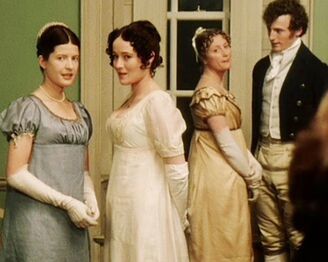 In Pride & Prejudice, Jane Bennet's serene conduct with Bingley helps her avoid “the suspicions of the impertinent."
In Pride & Prejudice, Jane Bennet's serene conduct with Bingley helps her avoid “the suspicions of the impertinent."Charlotte Lucas thinks Jane is making a tactical error. A woman can hide her feelings from the world, but “if a woman conceals her affection with the same skill from the object of it, she may lose the opportunity of fixing him; and it will then be but poor consolation to believe the world equally in the dark.”
There was no more important decision for a young woman in Jane Austen’s time, than who to marry – presuming she received an offer. And yet, genteel young ladies were supposed to act confused or indignant if someone impertinently suspected them of making a conquest. Young ladies were supposed to be so totally free of guile that they would never angle to attract someone. Whatever bears affinity to cunning is despicable, said Darcy. Marianne Dashwood is highly indignant when Sir John Middleton teases her about Willoughby. "That is an expression, Sir John," said Marianne, warmly, "which I particularly dislike. I abhor every common-place phrase by which wit is intended; and 'setting one's cap at a man,' or 'making a conquest,' are the most odious of all. Their tendency is gross and illiberal..."
The virtuous heroine does not even notice if someone is attracted to her. Adela, in Sarah Burney’s Traits of Nature, is staggered when her maid says she wishes Adela’s childhood sweetheart had taken her for his wife. “'Take me!' repeated Adela, staring with unaffected amazement at this suggestion. 'My dear Amy, how can you talk such wild nonsense?'” Of course, she marries him in the end. In the previous post, I wrote of how Clarentine, the heroine of a novel by Sarah Burney, was reduced to hysterics when the man she loved learned that she loved him.
One indicator of the vulgarity of the Steele sisters in Sense & Sensibility is that Miss Steele wants everyone to believe she has an admirer, while denying she has one. "There now," said Miss Steele, affectedly simpering, "everybody laughs at me so about the Doctor, and I cannot think why. My cousins say they are sure I have made a conquest; but for my part I declare I never think about him from one hour's end to another….
"Aye, aye, that is very pretty talking—but it won't do,” [answers the cheerful but also vulgar, Mrs. Jennings] — “the Doctor is the man, I see."
"No, indeed!" replied her cousin, with affected earnestness, "and I beg you will contradict it, if you ever hear it talked of."
Mrs. Jennings directly gave her the gratifying assurance that she certainly would NOT, and Miss Steele was made completely happy. The first time we meet Mr. Knightley, he scolds Emma for maneuvering a match between her governess and Mr. Weston. “Your time has been properly and delicately spent, if you have been endeavouring for the last four years to bring about this marriage. A worthy employment for a young lady's mind!” Knightley is stressing that she shouldn’t even be thinking of such things. It’s indelicate!
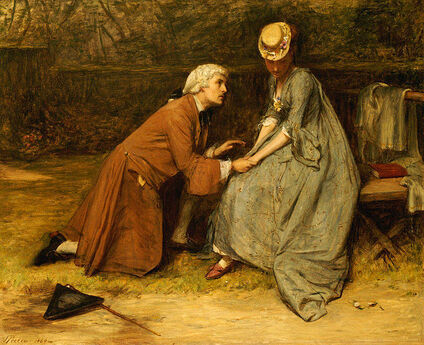 Keep those eyes downcast! In Northanger Abbey, Austen wrote: “for if it be true, as a celebrated writer has maintained, that no young lady can be justified in falling in love before the gentleman’s love is declared, it must be very improper that a young lady should dream of a gentleman before the gentleman is first known to have dreamt of her.”
Keep those eyes downcast! In Northanger Abbey, Austen wrote: “for if it be true, as a celebrated writer has maintained, that no young lady can be justified in falling in love before the gentleman’s love is declared, it must be very improper that a young lady should dream of a gentleman before the gentleman is first known to have dreamt of her.”Austen is referring to a 1751 essay by Samuel Richardson, an essay which was well-known in Austen’s day and frequently republished well into the 20th century: “That a young lady should be in love, and the love of the young gentleman undeclared is an heterodoxy which prudence, and even policy, must not allow.” Richardson extolls the good old days when young ladies kept their eyes downcast, left home only to go to church, and did not show any interest in a gentleman caller until their parents had sanctioned the match. Only then, could the young lady own “herself obliged to [her suitor] for his good opinion… and when he presses for the favour of her hand, he receives a declaration of an entire acquiescence with her duty, and a modest acknowledgment of esteem for him.”
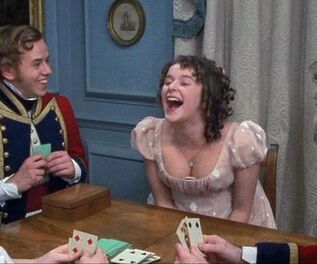 But alas, nowadays (says Richardson), the “ladies, maidens, wives, and widows, are engrossed by places of open resort and general entertainment… they are not ashamed to shew their faces wherever men dare go, nor blush to try who shall stare most impudently, or who shall laugh loudest on the publick walks.”
But alas, nowadays (says Richardson), the “ladies, maidens, wives, and widows, are engrossed by places of open resort and general entertainment… they are not ashamed to shew their faces wherever men dare go, nor blush to try who shall stare most impudently, or who shall laugh loudest on the publick walks.”Sir Thomas Bertram gives Fanny Price an epic dressing-down when he learns, to his astonishment, that she means to refuse Henry Crawford. The only concession he makes is that she didn’t encourage him. She received his attentions “very properly.” “I have no accusation to make on that head.”
Austen appears to acknowledge this social expectation of reticence while laughing at its hypocrisy. As Mrs. Smith says to Anne Elliot, until the “right moment” comes, “you know, we women never mean to have anybody. It is a thing of course among us, that every man is refused, till he offers.”
Fanny Price scolds herself for even thinking of Edmund romantically, not because it was indelicate, but because of the class divide between them: "To call or to fancy it a loss, a disappointment, would be a presumption for which she had not words strong enough to satisfy her own humility. To think of him as Miss Crawford might be justified in thinking, would in her be insanity. Why did such an idea occur to her even enough to be reprobated and forbidden? It ought not to have touched on the confines of her imagination." Is this evidence of Fanny's perfection or is she trying to live up to impossibly high standards? Austen scholar Mary Waldron argues it's the latter, and we'll take that up next time.
We can assume that despite social conventions, and despite the "pictures of perfection" in the novels of the day, young ladies of Austen's time found ways to encourage the attentions of the gentlemen they liked. In my Mansfield Trilogy, Fanny does get a rival for Edmund's lukewarm affections -- an impecunious poet. Click here for more about my books.
Published on February 10, 2021 00:00
CMP#28 Will You Be My Valentine?
 Clutching My Pearls is about Jane Austen and the times she lived in. Click here for the first in the series Will You Be My Valentine? Or, Reticence and Reality
Clutching My Pearls is about Jane Austen and the times she lived in. Click here for the first in the series Will You Be My Valentine? Or, Reticence and Reality
 In Pride & Prejudice, Jane Bennet's serene conduct with Bingley helps her avoid “the suspicions of the impertinent."
In Pride & Prejudice, Jane Bennet's serene conduct with Bingley helps her avoid “the suspicions of the impertinent."Charlotte Lucas thinks Jane is making a tactical error. A woman can hide her feelings from the world, but “if a woman conceals her affection with the same skill from the object of it, she may lose the opportunity of fixing him; and it will then be but poor consolation to believe the world equally in the dark.”
There was no more important decision for a young woman in Jane Austen’s time, than who to marry – presuming she received an offer. And yet, genteel young ladies were supposed to act confused or indignant if someone complimented them on making a conquest, as though courtship was always the furthest thing from their minds. Marianne Dashwood is highly indignant when Sir John Middleton teases her about Willoughby. "That is an expression, Sir John," said Marianne, warmly, "which I particularly dislike. I abhor every common-place phrase by which wit is intended; and 'setting one's cap at a man,' or 'making a conquest,' are the most odious of all. Their tendency is gross and illiberal..."
In the previous post, I wrote of how Clarentine, the heroine of a novel by Sarah Burney, was reduced to hysterics when the man she loved learned that she loved him. The virtuous Adela, in Sarah Burney’s Traits of Nature, is staggered when her maid says she wishes Adela’s childhood sweetheart had taken her for his wife. “'Take me!' repeated Adela, staring with unaffected amazement at this suggestion. 'My dear Amy, how can you talk such wild nonsense?'” Of course, she marries him in the end.
One indicator of the vulgarity of the Steele sisters in Sense & Sensibility is that Miss Steele wants everyone to believe she has an admirer, while denying she has one. "There now," said Miss Steele, affectedly simpering, "everybody laughs at me so about the Doctor, and I cannot think why. My cousins say they are sure I have made a conquest; but for my part I declare I never think about him from one hour's end to another….
"Aye, aye, that is very pretty talking—but it won't do,” [answers the cheerful but also vulgar, Mrs. Jennings] — “the Doctor is the man, I see."
"No, indeed!" replied her cousin, with affected earnestness, "and I beg you will contradict it, if you ever hear it talked of."
Mrs. Jennings directly gave her the gratifying assurance that she certainly would NOT, and Miss Steele was made completely happy. The first time we meet Mr. Knightley, he scolds Emma for maneuvering a match between her governess and Mr. Weston. “Your time has been properly and delicately spent, if you have been endeavouring for the last four years to bring about this marriage. A worthy employment for a young lady's mind!” Knightley is stressing that she shouldn’t even be thinking of such things. It’s indelicate!
 Keep those eyes downcast! In Northanger Abbey, Austen wrote: “for if it be true, as a celebrated writer has maintained, that no young lady can be justified in falling in love before the gentleman’s love is declared, it must be very improper that a young lady should dream of a gentleman before the gentleman is first known to have dreamt of her.”
Keep those eyes downcast! In Northanger Abbey, Austen wrote: “for if it be true, as a celebrated writer has maintained, that no young lady can be justified in falling in love before the gentleman’s love is declared, it must be very improper that a young lady should dream of a gentleman before the gentleman is first known to have dreamt of her.”Austen is referring to a 1751 essay by Samuel Richardson, an essay which was well-known in Austen’s day and frequently republished well into the 20th century: “That a young lady should be in love, and the love of the young gentleman undeclared is an heterodoxy which prudence, and even policy, must not allow.” Richardson extolls the good old days when young ladies kept their eyes downcast, left home only to go to church, and did not show any interest in a gentleman caller until their parents had sanctioned the match. Only then, could the young lady own “herself obliged to [her suitor] for his good opinion… and when he presses for the favour of her hand, he receives a declaration of an entire acquiescence with her duty, and a modest acknowledgment of esteem for him.”
 But alas, nowadays (says Richardson), the “ladies, maidens, wives, and widows, are engrossed by places of open resort and general entertainment… they are not ashamed to shew their faces wherever men dare go, nor blush to try who shall stare most impudently, or who shall laugh loudest on the publick walks.”
But alas, nowadays (says Richardson), the “ladies, maidens, wives, and widows, are engrossed by places of open resort and general entertainment… they are not ashamed to shew their faces wherever men dare go, nor blush to try who shall stare most impudently, or who shall laugh loudest on the publick walks.”Sir Thomas Bertram gives Fanny Price an epic dressing-down when he learns, to his astonishment, that she means to refuse Henry Crawford. The only concession he makes is that she didn’t encourage him. She received his attentions “very properly.” “I have no accusation to make on that head.”
Austen appears to acknowledge this social expectation of reticence while laughing at its hypocrisy. As Mrs. Smith says to Anne Elliot, until the “right moment” comes, “you know, we women never mean to have anybody. It is a thing of course among us, that every man is refused, till he offers.”
In Mansfield Park, Fanny scolds herself for even thinking of Edmund romantically, not because it was indelicate, but because of the class divide between them: "To call or to fancy it a loss, a disappointment, would be a presumption for which she had not words strong enough to satisfy her own humility. To think of him as Miss Crawford might be justified in thinking, would in her be insanity. Why did such an idea occur to her even enough to be reprobated and forbidden? It ought not to have touched on the confines of her imagination." Is this evidence of Fanny's perfection or is she trying to live up to impossibly high standards? Austen scholar Mary Waldron argues its the latter, and we'll take that up next time.
We can assume that despite social conventions, and despite the "pictures of perfection" in the novels of the day, young ladies of Austen's time found ways to encourage the attentions of the gentlemen they liked. In my Mansfield Trilogy, Fanny does get a rival for Edmund's lukewarm affections -- an impecunious poet. Click here for more about my books.
Published on February 10, 2021 00:00
February 2, 2021
CMP#27 Meet Clarentine
 Clutching My Pearls
is about Jane Austen and the times she lived in.
Click here
for the first in the series. Did You Think Fanny Price Was An Irritating Heroine? Meet Clarentine!
Clutching My Pearls
is about Jane Austen and the times she lived in.
Click here
for the first in the series. Did You Think Fanny Price Was An Irritating Heroine? Meet Clarentine!
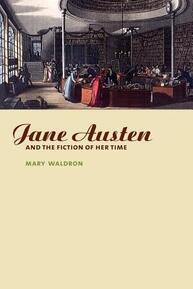 Dear reader, do you dislike Mansfield Park's heroine Fanny Price? Do you think her a goody-goody, a crybaby, a doormat? Well, wait until you meet Clarentine, the titular heroine of a three volume novel by Sarah Burney, half-sister to the more famous Fanny Burney. Austen scholar Mary Waldron says Clarentine is an example of a popular literary type of the day: “an exemplary girl who battles with worldliness and vice, emerging ultimately victorious after innumerable tribulations, misunderstandings and accusations.”
Dear reader, do you dislike Mansfield Park's heroine Fanny Price? Do you think her a goody-goody, a crybaby, a doormat? Well, wait until you meet Clarentine, the titular heroine of a three volume novel by Sarah Burney, half-sister to the more famous Fanny Burney. Austen scholar Mary Waldron says Clarentine is an example of a popular literary type of the day: “an exemplary girl who battles with worldliness and vice, emerging ultimately victorious after innumerable tribulations, misunderstandings and accusations.” As Waldron points out in Jane Austen and the Fiction of her Time, Austen may have drawn from the plot of Clarentine (1796) for Mansfield Park (1814). Clarentine lives in her uncle’s family, is persecuted and harassed by another aunt, “a Mrs. Norris-type figure,” who is afraid she will ensnare her cousin Edgar into marriage since they are growing up under the same roof. Clarentine is “banished to Sidmouth, where she is pursued by an attractive rake.”
The similarities to the plot of Mansfield Park are clear, yet, Mansfield Park is a masterpiece, while Clarentine is... well.... Sarah Burney read Austen's novels and thought highly of them, but it seems the compliment was not returned. Austen, Mary Waldron tells us, was “unreservedly scathing” about Clarentine, writing to Cassandra that the novel “is full of unnatural conduct and forced difficulties, without striking merit (in artistic terms) of any kind.” And I have so much gleeful scorn to pour on Clarentine that I doubt I will get it done in one blog post. That said, I read all three volumes with avidity, though often rolling my eyes, and enjoying the thought that Austen might have rolled her eyes at the exact same passages I was laughing at.
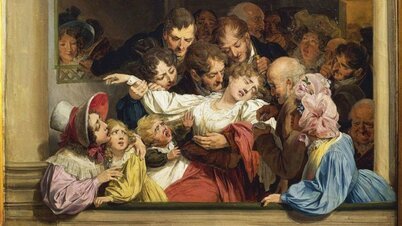 Louis Leopold Boilly, The Effect of Melodrama Modern readers are impatient with Fanny Price’s pearl-clutching over the private theatricals the young people want to put on at Mansfield. Why is she being such a stick-in-the-mud over a play? But Fanny’s got nothing on Clarentine.
Louis Leopold Boilly, The Effect of Melodrama Modern readers are impatient with Fanny Price’s pearl-clutching over the private theatricals the young people want to put on at Mansfield. Why is she being such a stick-in-the-mud over a play? But Fanny’s got nothing on Clarentine.When Clarentine’s London hostess, the vulgar Mrs. Barclay, invites her to go to the theatre, Clarentine is taken aback at Mrs. Barclay’s assumption that she would enjoy such tawdry amusements. “Clarentine stared at this unexpected question.” She excuses herself on the grounds that her (distant and miserably unkind) uncle has just died, and she has no mourning-clothes to wear in public.
When Clarentine is finally dragged -- much against her wishes -- to a public play, she doesn’t even make it through the front door. First she is terrified by the crush of people all around her in the street, then she is assailed with the impertinent remarks of strange men about her beauty, and finally, she is caught up in the surging crowd, “oppressed, staggered and overpowered to so great a degree, that after vainly contending for some time in agonies unspeakable with the fearful apprehensions that seized her, she lost all command over herself, and uttering a piercing shriek, fell back without sense or motion in [her escort’s] arms.” He must haul the “inanimate” heroine into a nearby shop, and then escort her home in a hired coach.
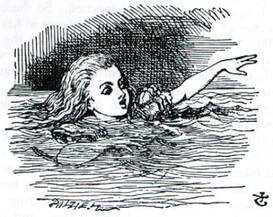 Clarentine is violently adored by this same escort, Mr. Eltham. When he pursues her to London, her first re-encounter with him “[dyes] her cheeks with crimson,” and leaves her “utterly bereft” of “either power or inclination to speak.” He loves her for her beauty, of course, but also because of her “noble frankness of disposition, softened by a delicacy so considerate, and a sweetness of temper so truly fascinating… although she was at times heavily depressed and incapable of joining in the conversation.”
Clarentine is violently adored by this same escort, Mr. Eltham. When he pursues her to London, her first re-encounter with him “[dyes] her cheeks with crimson,” and leaves her “utterly bereft” of “either power or inclination to speak.” He loves her for her beauty, of course, but also because of her “noble frankness of disposition, softened by a delicacy so considerate, and a sweetness of temper so truly fascinating… although she was at times heavily depressed and incapable of joining in the conversation.”Her extreme delicacy of sentiment means she is unable to explain her reactions to anyone. Praise of her guardian (the man she secretly loves) also draws tears from Clarentine’s eyes, praise from him undoes her entirely. Naturally, anything that reminds her of the man she loves -- such as the word “Northamptonshire” -- causes her to blush vividly, but when she isn't blushing, she's crying. Compared to Clarentine, Fanny Price is a stoic. Throughout the novel, if anyone –- cousin, friend, aunt, guardian, admirer, chaperone, lover -- speaks to Clarentine with sincerity, kindness, or concern, or if anyone scolds her, however mildly, she starts to weep, and is usually “quite overpowered” and “unable to speak.” She brings to mind that Tenniel illustration of Alice swimming in a lake of her own tears.
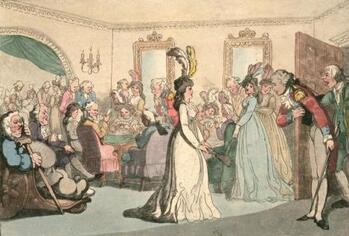 Thomas Rowlandson, The Comforts of Bath We are told that Clarentine’s diffidence is unaffected and her modesty is artless. Indeed, she never wastes an opportunity to let people know just how unpretending and artless she is. During a trip to Bath, the foppish Mr. Westbury, knowing that she has just come from London, asks her if the “public places” are busy. Clarentine lets him know “Oh, as to the public places, I know nothing.” When the kindly old widow who is superintending her in Bath bids her to dress for the ball, so that she can appraise her “plumes and decorations,” Clarentine sets her straight: “I am afraid, a dress so simple as that I shall wear will neither be worth your attention, Madam, or Mr. Westbury’s… I will endeavour, then, to be as correct in these matters as I can; but really I know so little of the business of a toilet that I am afraid I shall succeed very ill at last.”
Thomas Rowlandson, The Comforts of Bath We are told that Clarentine’s diffidence is unaffected and her modesty is artless. Indeed, she never wastes an opportunity to let people know just how unpretending and artless she is. During a trip to Bath, the foppish Mr. Westbury, knowing that she has just come from London, asks her if the “public places” are busy. Clarentine lets him know “Oh, as to the public places, I know nothing.” When the kindly old widow who is superintending her in Bath bids her to dress for the ball, so that she can appraise her “plumes and decorations,” Clarentine sets her straight: “I am afraid, a dress so simple as that I shall wear will neither be worth your attention, Madam, or Mr. Westbury’s… I will endeavour, then, to be as correct in these matters as I can; but really I know so little of the business of a toilet that I am afraid I shall succeed very ill at last.”We are also told of Clarentine’s exquisite propriety of conduct, but there are some odd Georgian lapses: While attending that same ball, she watches in amusement as a new friend, Mr. Manners, exposes the foppery of Mr. Westbury: Mr. Manners points out a “poor girl who was extremely deformed and yet dressed in the most extravagant height of the ton” and he asks Mr. Westbury, “what say you to that fair nymph, Westbury?” When Westbury compliments her clothing, without insulting the girl's figure, both Mr. Manners and Clarentine burst into laughter.
Clarentine is more apt to take offense at improper remarks directed at her, rather than at anyone else; if she is, as Waldron contends, a model of “right conduct,” then “right conduct” means being constantly “confused,” or “surprised,” or “taken aback,” by a vulgarity, a too-effusive compliment, a too-familiar greeting, or a too-familiar glance of admiration. Clarentine comes to believe that Captain Somerset, her guardian, is falling for a witty but immoral woman. Unlike Fanny Price, who keeps her heartache over Edmund and Mary Crawford to herself, Clarentine turns cold and haughty toward the captain, (a man who has just showered her with money and gifts, in his capacity as guardian). This is a turn of events he accepts gracefully, but with bewilderment. Captain Somerset might ably command a ship full of sailors, but figuring out one moody teenage girl is beyond him:
“Could I divine, my beloved Clarentine, what passes in that gentle bosom, and penetrate its secret sorrows [he pleads], with what earnest anxiety would I endeavour to alleviate them! You acknowledge,” added he, “some regard, some esteem for me, but when, when will those sentiments animate again into confidence and affection? You cannot have a grief in which, mysterious as you are, I do not participate; say then, sweetest Clarentine! tell me why that bitter sigh and these involuntary tears?”
Alas, the moment of éclaircissement is delayed for a few hundred more pages, because Clarentine’s rival shows up just at that moment, and the affronted heroine rushes into her room, locks the door and refuses to come down to dinner.
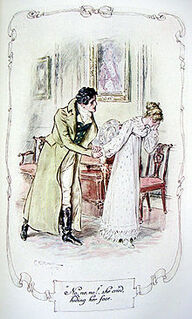 Proposals of marriage are so difficult to bear! Fanny rejects Henry When Mr. Manners tells Captain Somerset that Clarentine secretly loves him, thus opening the way for a happy ending, Clarentine is not grateful for her friend's help -- she is mortified and goes into hysterics. (We recollect from Northanger Abbey that etiquette decreed that young ladies could not admit to liking a man before the man first declared himself.)
Proposals of marriage are so difficult to bear! Fanny rejects Henry When Mr. Manners tells Captain Somerset that Clarentine secretly loves him, thus opening the way for a happy ending, Clarentine is not grateful for her friend's help -- she is mortified and goes into hysterics. (We recollect from Northanger Abbey that etiquette decreed that young ladies could not admit to liking a man before the man first declared himself.)“[S]hocked to find she had thus cruelly exposed herself... Clarentine exclaims [through her convulsive sobs] ’Oh! dearest Mrs. Denbigh, ‘how am I ever to meet Mr. Somerset again? Indeed, indeed, I cannot bear to think of it… Where can I conceal my consciousness and my shame?’” She begs Mrs. Denbigh to tell the captain that she does not love him. Better to lose all hope of gaining him, than have him think of her as ill-bred and forward. Mrs. Denbigh refuses: “Be a little rational, and give me no commissions of this sublime, but lying kind.”
Our hero decides to propose to Clarentine by letter, probably because he fears an in-person proposal of marriage might be fatal to this sensitive plant. She accepts by return of post, and though it seems quite unnecessary for her to add that she is crying as she writes -- I think he would be in no suspense on that point -- she does let him know her eyes are blinded by tears. The fortunate man moves on to pleading with her to set a date for the wedding and contending with her bashful refusals to do so. Clarentine was praised in the Monthly Review for its ‘morality of sentiment'. It is the kind of moral tale, which, to use the parlance of the time, you could safely place in the hands of your daughter or sister. Sarah Burney explained in her private letters that she was writing for the market; if it was up to her, she wouldn’t even put love stories in her novels, but she wrote to support herself, so she needed to produce love stories. So maybe her portrait of the perfect female says more about the times she lived in than her own convictions about female rectitude.
So is Clarentine, this sobbing, quivering, bundle of neuroses, really a portrait of the perfect Georgian female? The kind of girl whose example will edify the young female reader, and rouse in her the desire to emulate her virtue? And is Fanny Price also a perfect heroine? Mary Waldron says Fanny is not perfect, and further, she is not intended to be. More about that next time. In my variation on Mansfield Park, the theatricals at Mansfield do proceed to the dress rehearsal because Sir Thomas does not suddenly return from Antigua. This sends events spinning off on an entirely differently track for Maria Bertram, Henry Crawford, and Mr. Rushworth. Read more about A Contrary Wind and my Mansfield Trilogy here.
Published on February 02, 2021 00:00



